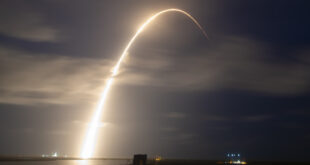SpaceWatch.Global asked its staff and contributors to review 2019 and provide an outlook into 2020. These personal reviews are being published during the holiday season. This is Dr. Bleddyn Bowen of University of Leicester.
by Dr. Bleddyn Bowen

2019 continued the elevated status of astropolitics and space policy in mainstream media and policy communities. In the United States, the re-established National Space Council continued to work to reform the links between American military and commercial spacepower, and Congress eventually legislated the ‘Space Force’, or a semi-independent space corps within the U.S. Air Force. Whilst the new U.S. Space Force will likely be the start of a long-term transformation of American spacepower acquisition and military astroculture which will impact all space powers in one way or another, events closer to home are my highlights of 2019 and also set the stage for what’s in store in 2020.
In the UK the Government announced that Joint Forces Command (JFC) would be reformed into UK Strategic Command (UKSTRATCOM) which will oversee the British military’s cyber warfare and space capabilities and services. Details remain rather scant at this point – especially as JFC was already understaffed and overtasked with the new UKSTRATCOM taking on more responsibilities from the Royal Air Force (RAF) with regard to space operations. The lack of detail and transparency is a continuing theme from the British state regarding its renewed interest in military space activities.
The delay of the publication of the Defence Space Strategy – now many years behind schedule despite many announcements of its forthcoming nature – will continue into 2020 as well. Its continued absence, the off-hand mention of a UK ‘Space Command’ in the 2019 General Election Conservative manifesto, and the repeatedly-announced yet vaguely-detailed formulation of the cabinet-level National Space Council, do raise questions as to the quality and coherence of top-level strategic direction in Whitehall on military space organisation. In 2020 I look forward to seeing whether the UK Government, now perhaps enjoying some level of stability with a majority in Westminster, will provide the funding and extra personnel necessary to realise the ambition behind such lofty rhetoric.
I remain sceptical of substantial progress in these initiatives as funds and personnel are in extremely short supply in the MoD, particularly if £5 billion will be allocated to a UK Galileo-replacement satellite navigation system. I have repeatedly questioned the wisdom of this programme elsewhere, and it appears the UK Government will be committing to it in an announcement penned for March 2020.
On the topic of budgeting and funding, looking into 2020, the continuing discussion of the European Union’s (EU) 2021-27 Multiannual Financial Framework (MFF) may have direct impact on the continuing evolution of the European space policy landscape. Following the Galileo-Brexit debacle in 2018, the Commission explicitly floated the idea of developing an EU space agency out of the European GNSS Agency (GSA). Britain is now a very large non-EU member of ESA and could cause problems for ESA’s governance of EU-funded space projects in ESA. Article 31, Volume 7 of the 2021-27 MFF proposal from 2018 states that the European Space Agency must ensure that its internal governance mechanisms do not prejudice EU interests, especially in EU-funded space projects implemented by ESA, such as Galileo and Copernicus. The desire to develop an EU ‘Agency for the Space Programme’ is an institutional tank parked on ESA’s lawn. 2020 may see increased discussions and statements from Member States on the direction of the proposal to develop an EU Space Agency as a replacement to ESA as direct EU space capabilities grow.
From this vantage point, it is unknown what the Member States of both the EU and ESA think of a new EU Space Agency, as many states are comfortable in the existing EU-ESA institutional landscape and decision-making processes, having successfully won arguments, project controls, and funding debates and procedures within ESA. Transferring some European space activities to an EU space agency will create a new bureaucratic game for states to learn to play, and some Member States may prefer it or the current set-up with ESA.
This year also saw a remarkable increase in ESA’s budget following the triannual ESA ministerial summit, showing an increasing ambition within both ESA and the EU to entrench European autonomy and cutting-edge space technology, including debris capture and participating in the American Lunar Gateway project. Whilst ESA can now realise many of its ambitions in space, and as Galileo will likely be fully operational in 2020, they may be convenient and positive cover stories to mask serious institutional wrangling over the future direction of ‘EUropean’ spacepower in the context of the finalisation of the 2021-27 MFF.
2020 is set to be an interesting year ahead in European space: the potential post-Brexit trade deal with the EU being confirmed, an EU challenge to the institutional status quo of European space integration, and the continuing institutional changes in British military space. Expect more commentary on these fronts in my 2020 columns for SpaceWatch.Global!
Dr. Bleddyn Bowen is a Lecturer in International Relations at the University of Leicester, specialises in space warfare and classical military philosophy, and teaches astropolitics, Cold War history, and modern warfare. He has published in several academic journals and provides advice and insight to practitioners on UK space policy, military doctrine, and European space policy, including to the UK House of Commons Exiting the EU Select Committee. Currently Bleddyn is completing his book manuscript provisionally entitled War in Space: Strategy, Spacepower, and Geopolitics, forthcoming with Edinburgh University Press, and convenes the informal research network The Astropolitics Collective.
 SpaceWatch.Global An independent perspective on space
SpaceWatch.Global An independent perspective on space



